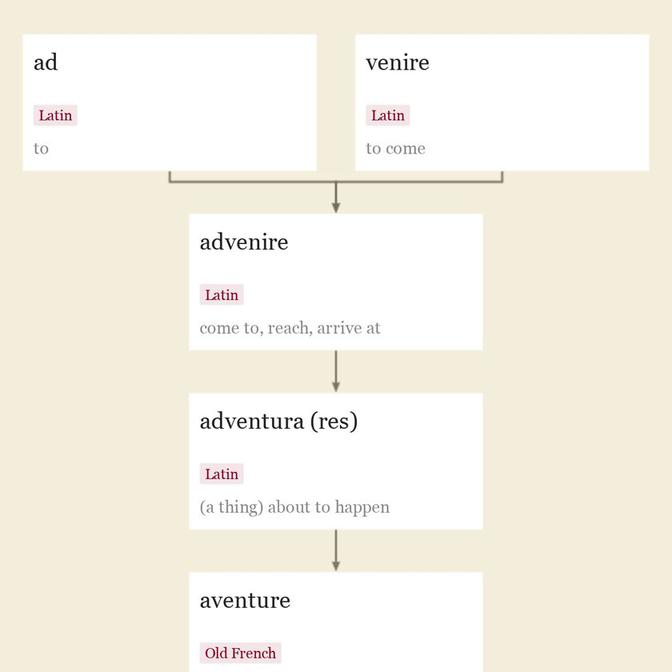misadventure (n.)
"不幸的经历,糟糕的经历,厄运,灾难",公元1300年, misaventure,源自古法语 mesaventure(12世纪)"事故,不幸",源自 mesavenir "变得糟糕"; 参见 mis-(2)+ adventure(名词)在旧义上指"偶然发生的事情,运气,幸运"。在公元1600年后,采用了 -d- 的拼写规则。
misadventure 的相关词汇

约公元1200年, aventure, auenture 指“偶然发生的事情,运气,幸运”,源自于古法语 aventure(11世纪)指“机会,意外,事件,发生”,源自拉丁语 adventura (res) 指“(一件)即将发生的事情”,来自于 adventurus 的女性形式,该词是 advenire 的未来分词,意为“到达,到达,到达”。这来自于 ad “到”(参见 ad-)+ venire “来”(来自 PIE 词根 *gwa- 的一个后缀形式,意为“去,来”)。
该词义经过了“风险; 危险”(试验一个人的机会),约公元1300年,和“危险的事业”(14世纪晚期)发展到“生活中的新奇或令人兴奋的事件,显著的发生”(1560年代)。
早期它还指“奇迹,奇迹; 神奇事物的描述”(13世纪)。英语在15世纪至16世纪恢复了 -d-; 在法语中,大约在同一时间试图恢复它,但被拒绝了。 Venture 是15世纪的一个变体。德语 Abenteuer 是法语单词的借用,显然是受 Abend “晚上”的影响而古怪地变形。
拉丁语词源中的词缀元素(在 mischief 、miscreant 、misadventure 、misnomer 等词中使用),源自古法语 mes-,意为“坏的,错误的”,源自通俗拉丁语 * minus-,源自拉丁语 minus “更少”(来自 PIE 词根 *mei-(2)“小”的后缀形式),在拉丁语中并未用作前缀,但在罗曼语中被附加到单词上作为贬义或否定元素。法语中的形式可能受到了古法语中 *miss- 的影响,后者是 mis-(1)的法兰克(日耳曼)形式。
*gwā-,也写作 *gwem-,原始印欧语根,意为“去,来”。
它构成或部分构成以下单词: acrobat; adiabatic; advent; adventitious; adventure; amphisbaena; anabasis; avenue; base(名词)“任何物体的底部”; basis; become; circumvent; come; contravene; convene; convenient; convent; conventicle; convention; coven; covenant; diabetes; ecbatic; event; eventual; hyperbaton; hypnobate; intervene; intervenient; intervention; invent; invention; inventory; juggernaut; katabatic; misadventure; parvenu; prevenient; prevent; provenance; provenience; revenant; revenue; souvenir; subvention; supervene; venire; venue; welcome。
它是以下单词的假设来源/其存在的证据由以下单词提供: gamati(梵语)“他走”, jamaiti(阿维斯塔语)“走”, kakmu(托卡拉语)“来”, gemu, gimti(立陶宛语)“出生”, bainein(希腊语)“走,步行”, venire(拉丁语)“来”, cuman(古英语)“来,接近”, kommen(德语), qiman(哥特语)。